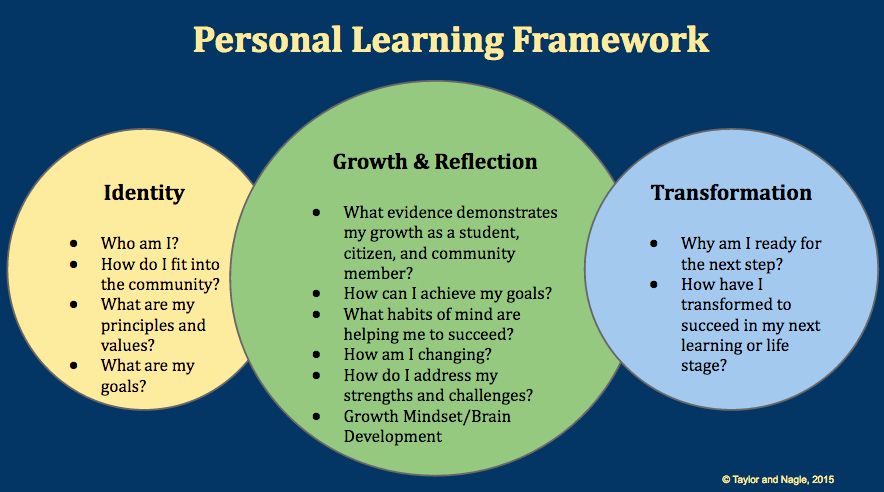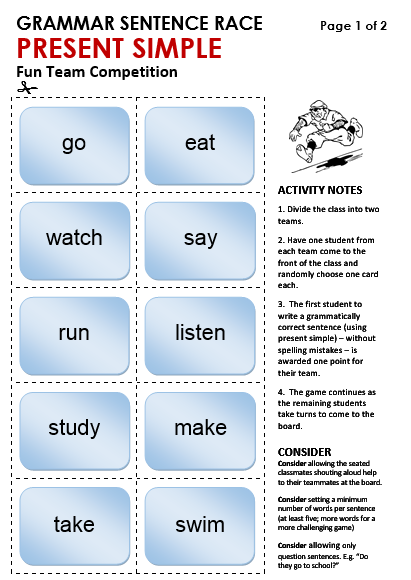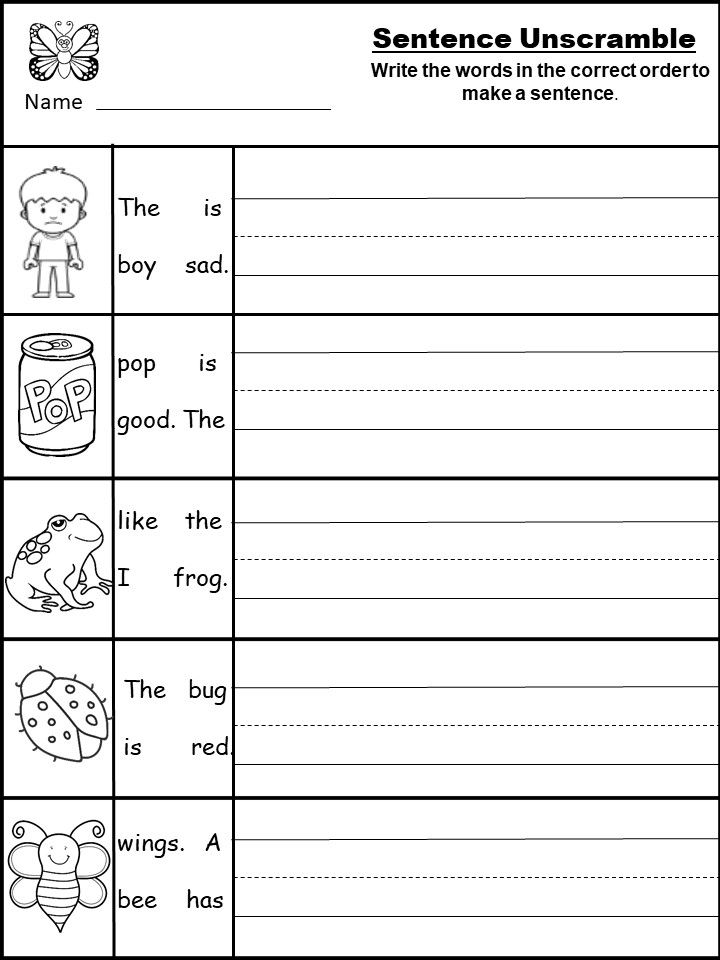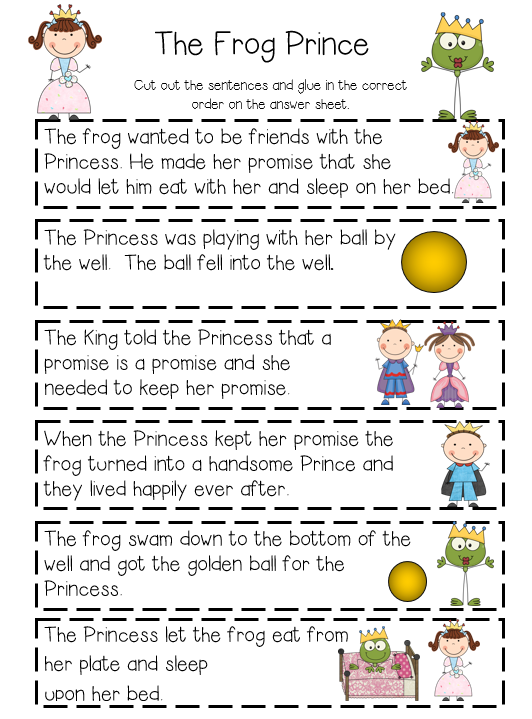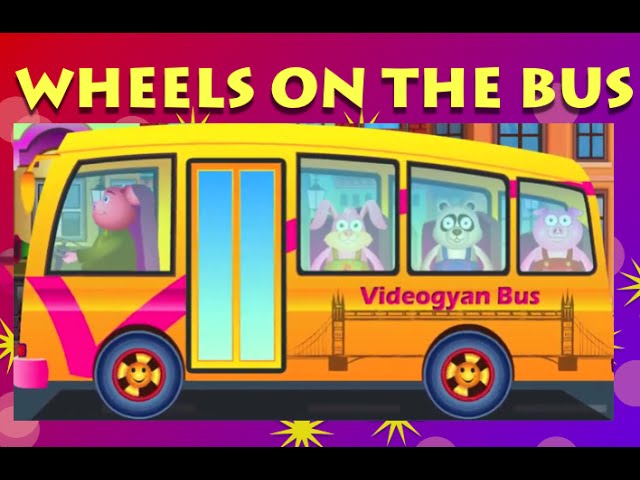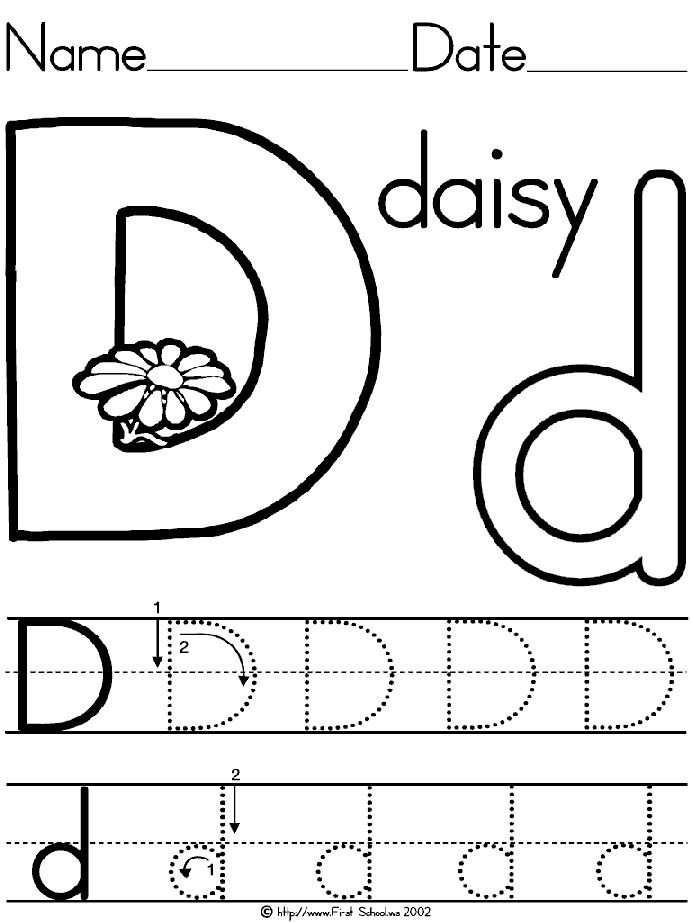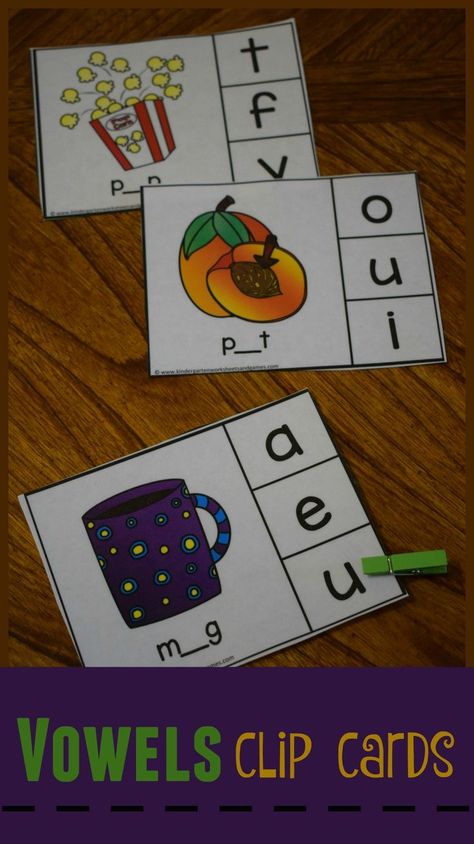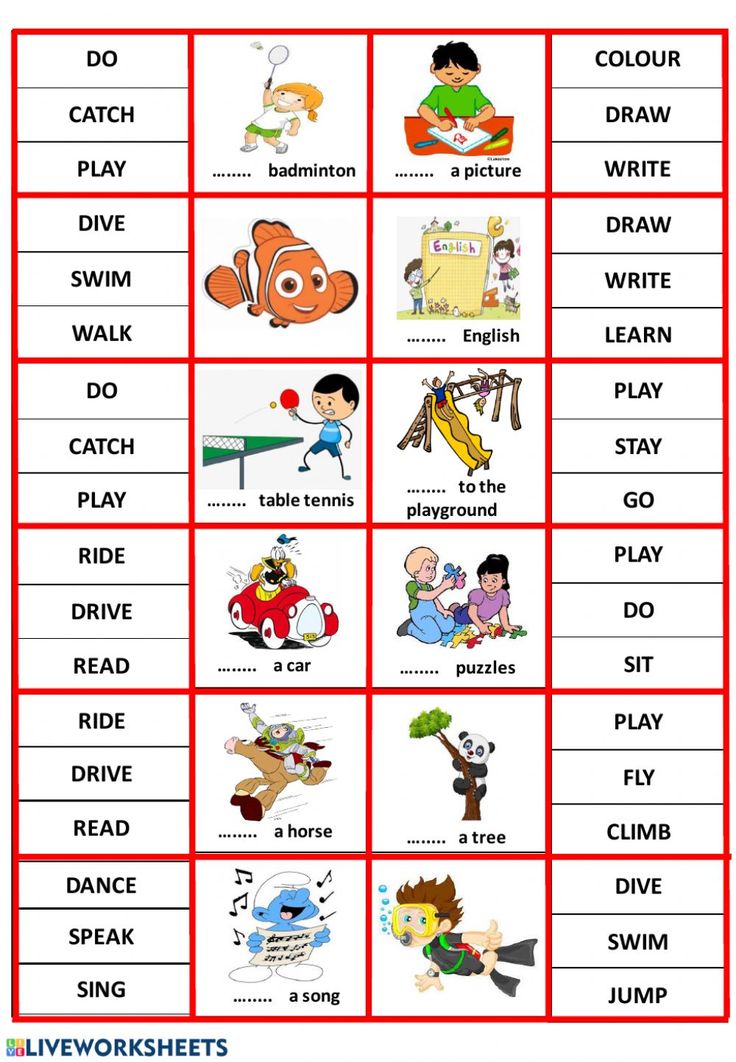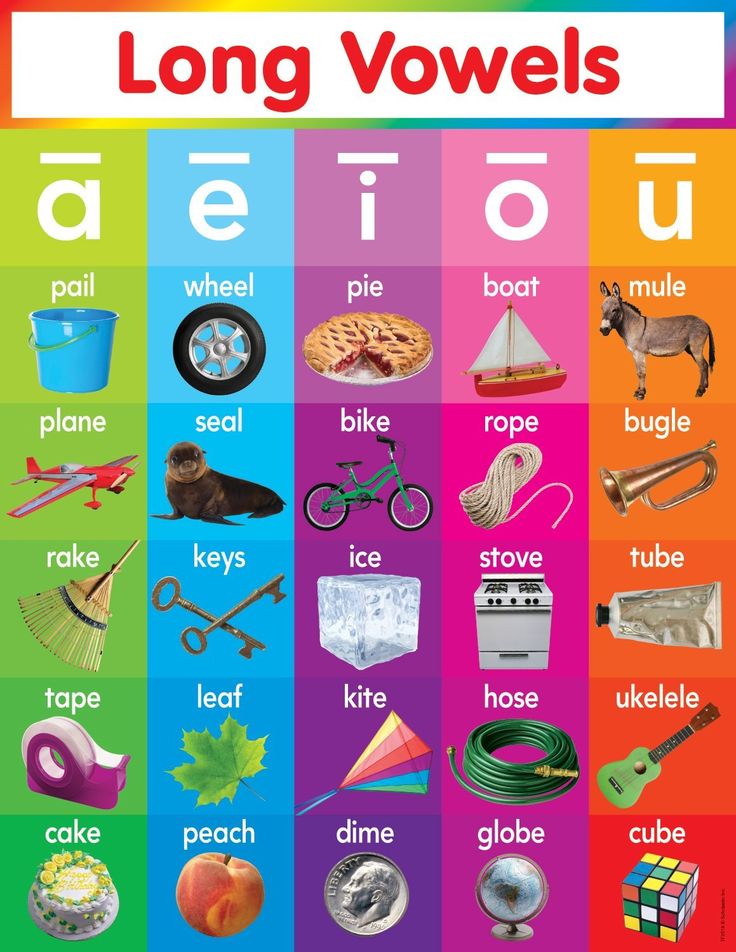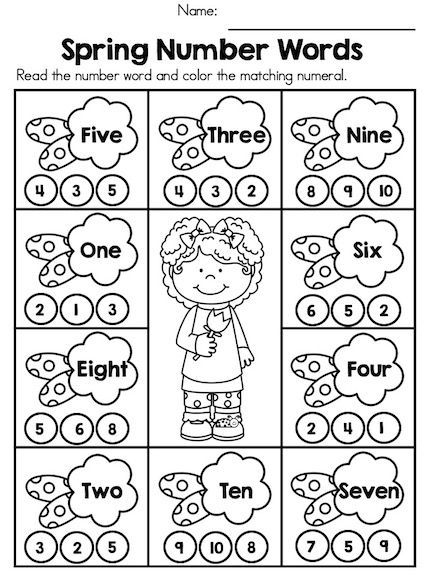Social behavior skills
Social Skills: Promoting Positive Behavior, Academic Success, and School Safety
Good social skills are critical to successful functioning in life. These skills enable us to know what to say, how to make good choices, and how to behave in diverse situations. The extent to which children and adolescents possess good social skills can influence their academic performance, behavior, social and family relationships, and involvement in extracurricular activities. Social skills are also linked to the quality of the school environment and school safety.
While most children pick up positive skills through their everyday interactions with adults and peers, it is important that educators and parents reinforce this casual learning with direct and indirect instruction. We must also recognize when and where children pick up behaviors that might be detrimental to their development or safety. In the past, schools have relied exclusively on families to teach children important interpersonal and conflict resolution skills.
However, increased negative societal influences and demands on family life make it imperative that schools partner with parents to facilitate this social learning process. This is particularly true today given the critical role that social skills play in maintaining a positive school environment and reducing school violence.
Consequences of Good Social Skills
With a full repertoire of social skills, students will have the ability to make social choices that will strengthen their interpersonal relationships and facilitate success in school. Some consequences of good social skills include:
- Positive and safe school environment.
- Child resiliency in the face of future crises or other stressful life events.
- Students who seek appropriate and safe avenues for aggression and frustration.
- Children who take personal responsibility for promoting school safety.
Consequences of Poor Social Skills
Students with poor social skills have been shown to:
- Experience difficulties in interpersonal relationships with parents, teachers, and peers.
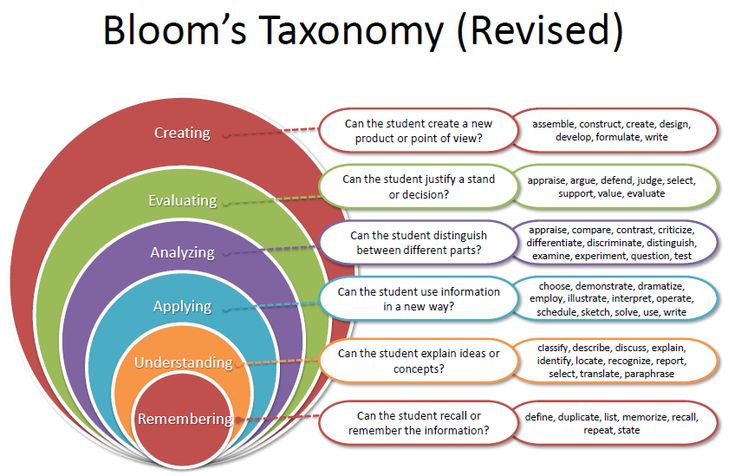
- Evoke highly negative responses from others that lead to high levels of peer rejection. Peer rejection has been linked on several occasions with school violence.
- Show signs of depression, aggression and anxiety.
- Demonstrate poor academic performance as an indirect consequence.
- Show a higher incidence of involvement in the criminal justice system as adults.
Impact on School Safety
Given the demonstrated relationship between social skills and school safety, schools are increasingly seeking ways to help students develop positive social skills, both in school and in the community. Social skills related to school safety include:
- Anger management
- Recognizing/understanding others' point of view
- Social problem solving
- Peer negotiation
- Conflict management
- Peer resistance skills
- Active listening
- Effective communication
- Increased acceptance and tolerance of diverse groups
In isolation, social skills are not sufficient to ensure school safety; interventions should not be limited to student instruction and training.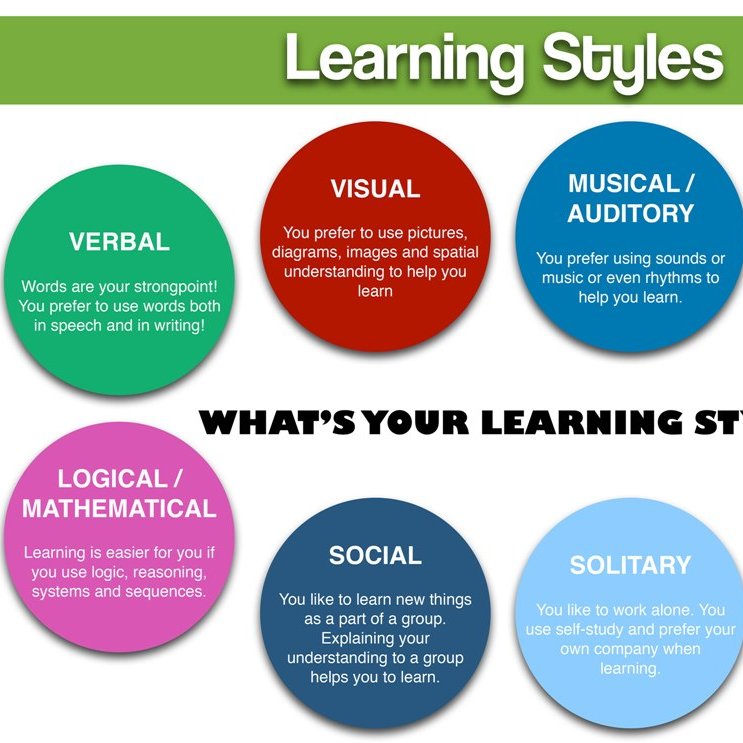 Change in the school culture should be facilitated by infusing social skills training into a comprehensive system of school safety and discipline policies, emphasizing relationship-building between students and faculty (teachers and administrators) and between schools and families, and providing effective behavior management and academic instruction.
Change in the school culture should be facilitated by infusing social skills training into a comprehensive system of school safety and discipline policies, emphasizing relationship-building between students and faculty (teachers and administrators) and between schools and families, and providing effective behavior management and academic instruction.
Defining Types of Social Skills
While there are hundreds of important social skills for students to learn, we can organize them into skill areas to make it easier to identify and determine appropriate interventions. For example, the "Stop and Think" program organizes skills into four areas:
1. Survival skills (e.g., listening, following directions, ignoring distractions, using nice or brave talk, rewarding yourself)
2. Interpersonal skills (e.g., sharing, asking for permission, joining an activity, waiting your turn)
3. Problem-solving skills (e.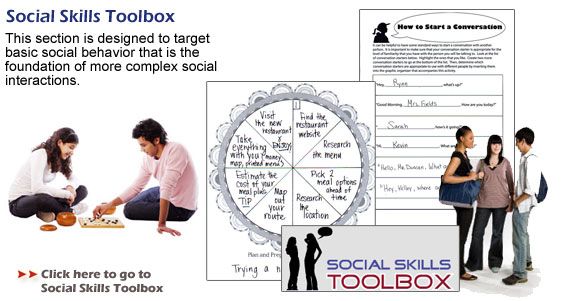 g., asking for help, apologizing, accepting consequences, deciding what to do)
g., asking for help, apologizing, accepting consequences, deciding what to do)
4. Conflict resolution skills (e.g., dealing with teasing, losing, accusations, being left out, peer pressure)
Identifying Social Skills Deficits
Prior to determining the best means to help a student develop better social skills, it is important to understand specifically what a student can and can't do. It is crucial to assess and classify the nature of a child's social skill deficits in order to devise and implement the most appropriate intervention.
Children may experience difficulty performing a skill:
- Due to lack of knowledge (acquisition deficits), e.g., the child does not know the skills or does not discriminate when a skill is appropriate. For example, a child grabs a pencil from a peer in class when she needs one because she does not know how to appropriately ask to borrow it.
- Consistently despite knowledge (performance deficits), e.
 g., the child knows how to perform the skills but fails to do so consistently or at an acceptable level of competence. For example, although the child understand that he should raise his hand to speak in class, and does so much of the time, he will sometimes blurt out a comment without raising his hand.
g., the child knows how to perform the skills but fails to do so consistently or at an acceptable level of competence. For example, although the child understand that he should raise his hand to speak in class, and does so much of the time, he will sometimes blurt out a comment without raising his hand. - To a sufficient degree or level of strength (fluency deficits), e.g., the child knows how to perform skill and is motivated to perform, but demonstrates inadequate performance due to lack of practice or adequate feedback. For example, a student has learned what to say and do when confronted with bullying behavior, but her responses are not yet strong enough to be successful.
- Due to competing skill deficits or behaviors, e.g., internal or external factors interfere with the child demonstrating a learned skill appropriately. For example, depression, anxiety, hyperactivity, or negative motivation can interfere with demonstration of appropriate conflict resolution skills, even though the skills have been taught and learned.
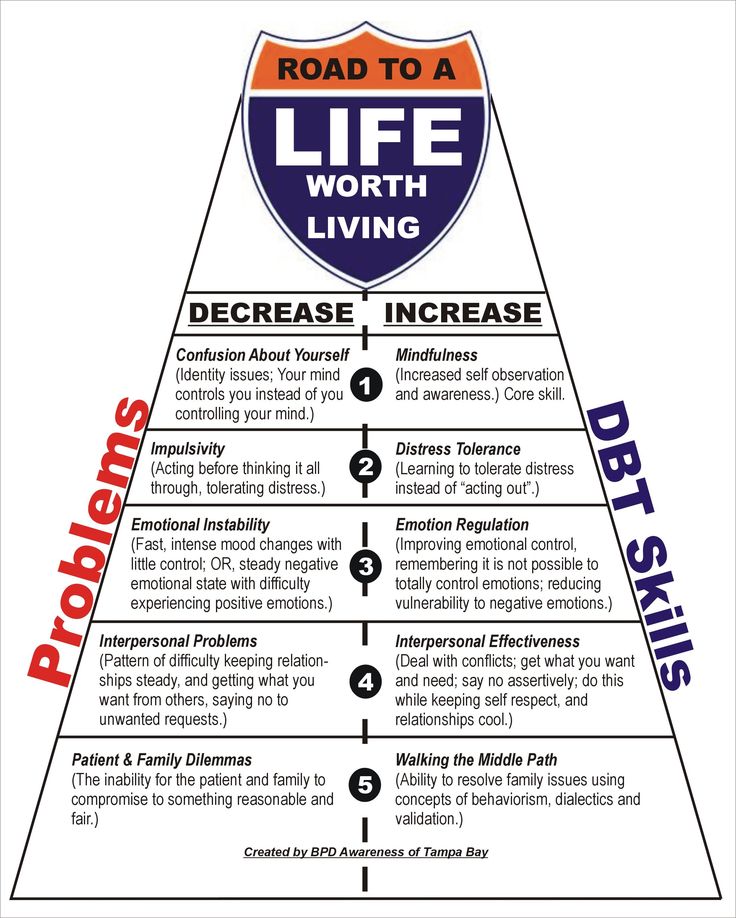
Social Skills Interventions
Effective social skills programs are comprised of two essential elements: a teaching process that uses a behavioral/social learning approach and a universal language or set of steps that facilitates the learning of new behavior. Interventions can be implemented at a school-wide, specific setting, classroom, or individual level, but at all levels the emphasis is on teaching the desired skill, not punishing negative behaviors.
Facilitate learning through normal activities. Teachers and parents must take advantage of incidental learning, in which naturally occurring behaviors or events are used to teach and reinforce appropriate social behavior. Adults can reinforce demonstrated positive social skills by praising children when they behave correctly, or offer alternatives to poor decisions to teach the more appropriate behavior. It may be necessary when working with children who have particular difficulty to intentionally "catch" them doing the right thing or devise situations in which they can make a good choice.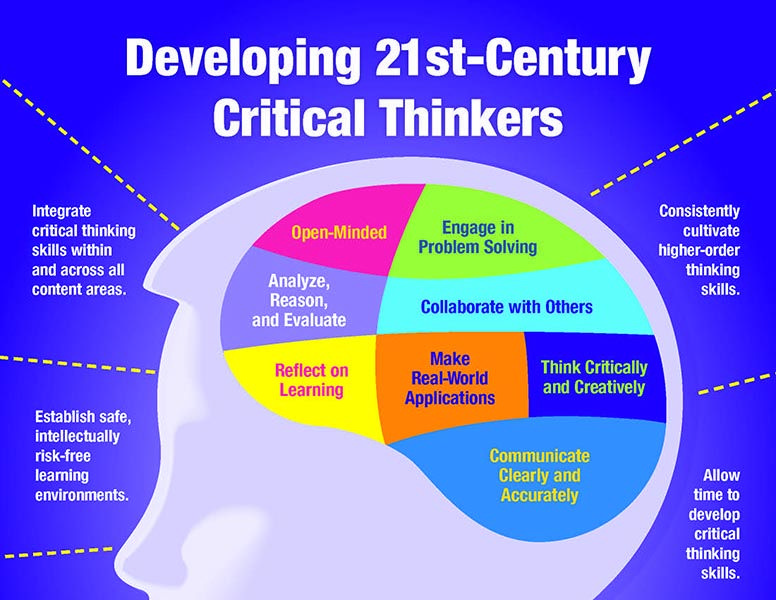
Address environmental factors. The school or home environment can affect a child's ability to learn and perform good social skills. If a child is experiencing difficulty demonstrating a particular skill, it is best to first evaluate the environment to determine what might interfere with the child's appropriate acquisition of that skill. For instance, a student may be unruly at the beginning of the day because the teacher needs to establish more specific routines for coming into class, hanging up coats, checking in, etc. Addressing environmental obstacles like this also will benefit all children in that environment.
Address individual factors. Some children need more intensive, personalized training because of individual factors, such as a disability. These interventions might be aimed at children experiencing a specific difficulty or those who have previously been identified as at risk for behavior problems. For example, studies have shown that children with mild disabilities tend to exhibit deficient social skills and excess problem behaviors more than students without such disabilities.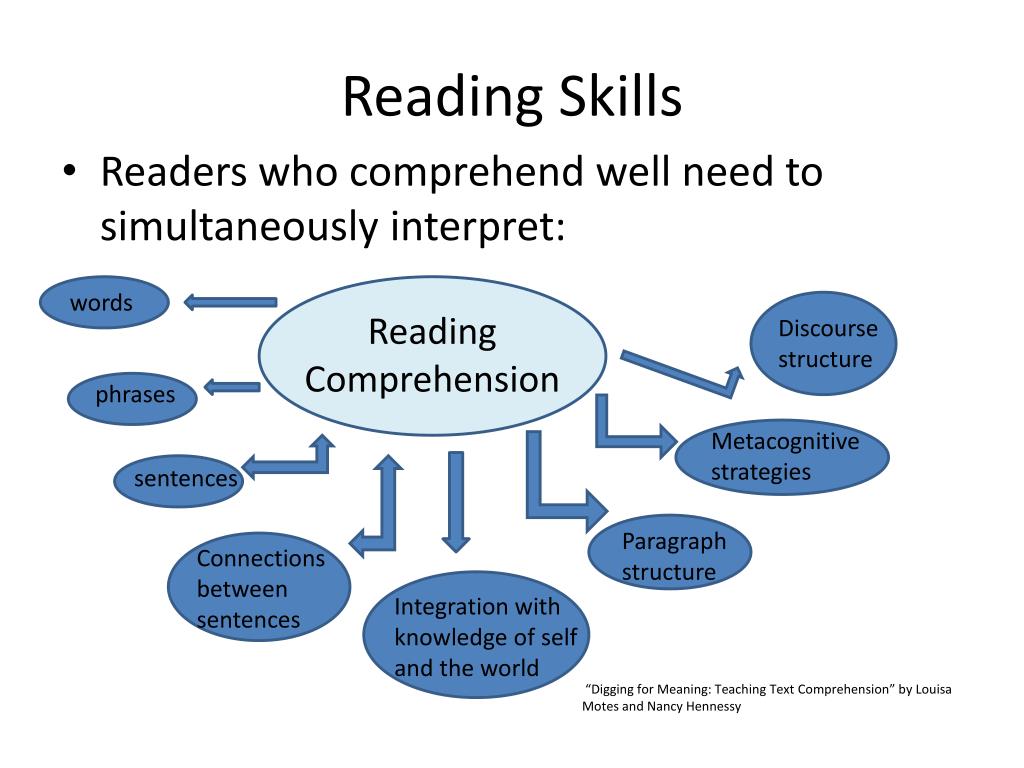 Interventions aimed at at-risk students are based on individual assessment of the particular child's skills and deficits. Selected interventions aim to prevent existing behavior problems from developing into more serious ones.
Interventions aimed at at-risk students are based on individual assessment of the particular child's skills and deficits. Selected interventions aim to prevent existing behavior problems from developing into more serious ones.
Social skills training should:
- Focus on facilitating the desirable behavior as well as eliminating the undesirable behavior.
- Emphasize the learning, performance, generalization, and maintenance of appropriate behaviors through modeling, coaching, and role-playing. It is also crucial to provide students with immediate performance feedback.
- Employ primarily positive strategies and add punitive strategies only if the positive approach is unsuccessful and the behavior is of a serious and/or dangerous nature.
- Provide training and practice opportunities in a wide range of settings with different groups and individuals in order to encourage students to generalize new skills to multiple, real life situations.
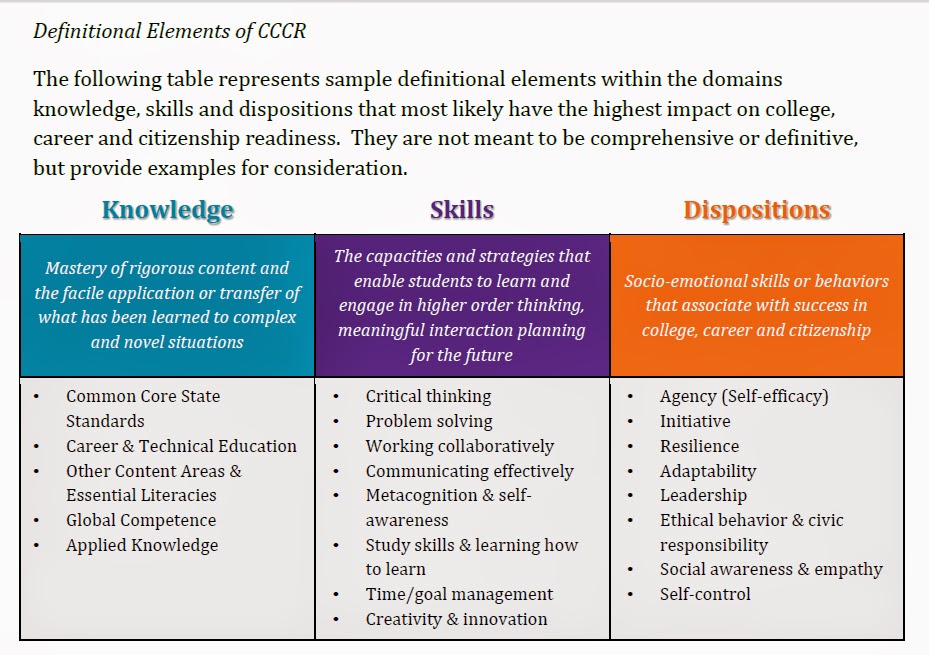
- Draw on assessment strategies, including functional assessments of behavior, to identify those children in need of more intensive interventions as well as target skills for instruction.
- Look to enhance social skills by increasing the frequency of an appropriate behavior in a particular situation. This should take place in "normal" environments to address the naturally occurring causes and consequences.
When planning social skills training programs, schools should:
- Include parents and other caregivers, both to help develop and select interventions and as significant participants in interventions. (Parents and caregivers can help reinforce the skills taught at school to further promote generalization across settings.)
- Focus on all age groups, including children below the age of 9 who are often bypassed due to the erroneous belief that they will "grow out of it."
- Avoid a "one size fits all" approach and adapt the intervention to meet the individual or particular group needs.
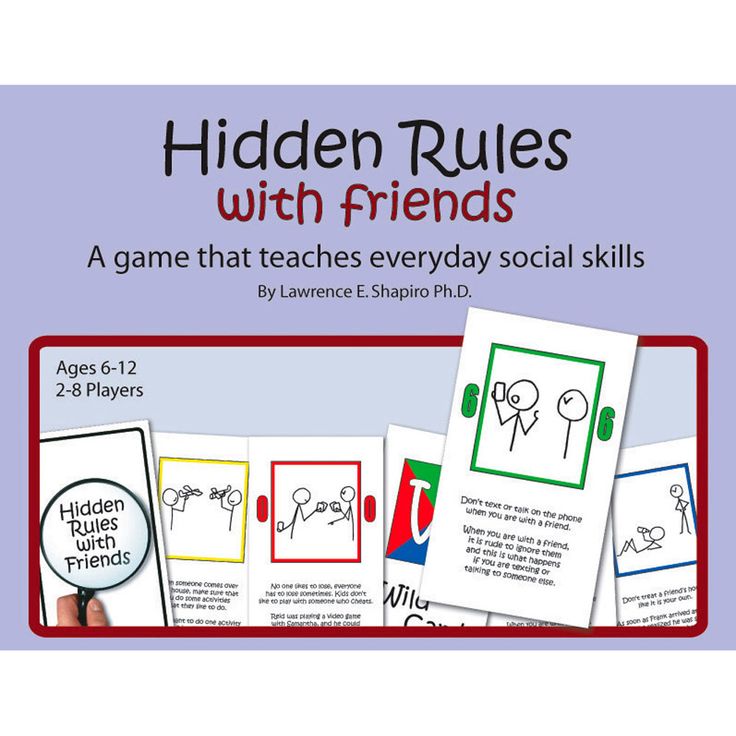 Students who speak English as a Second Language might need intensive social skill instruction to promote acculturation and peer acceptance. Children with disabilities might need adaptive curriculum and learning strategies. Most children will need a combination of different strategies that are matched to their particular deficits and backgrounds.
Students who speak English as a Second Language might need intensive social skill instruction to promote acculturation and peer acceptance. Children with disabilities might need adaptive curriculum and learning strategies. Most children will need a combination of different strategies that are matched to their particular deficits and backgrounds.
Examples of evidence-based social skills programs
Often school administrators or mental health professionals opt to introduce one of the many empirically supported, commercially published programs into their schools. Effective existing social skills training programs include:
- "Stop and Think" Social Skills Program (Knoff): Part of Project ACHIEVE (Knoff and Batsche). Has demonstrated success in reducing student discipline referrals to the principal's office, school suspensions, and expulsions; fostering positive school climates and prosocial interactions; increasing students' on-task behavior; and improving academic performance.
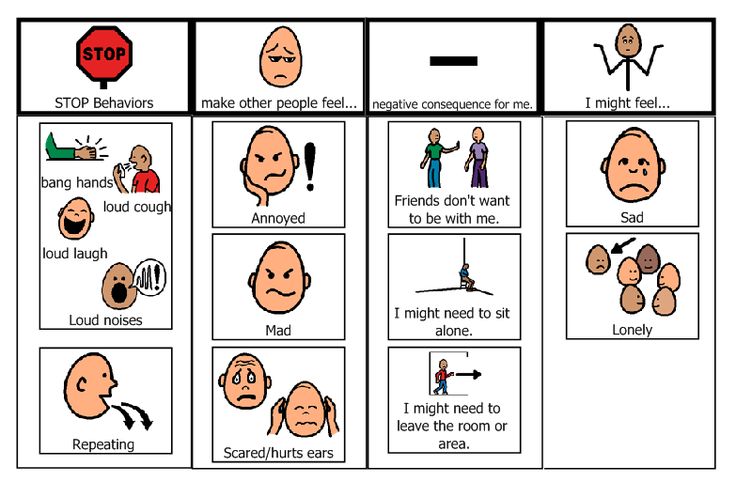 http://www.coedu.usf.edu/projectachieve/
http://www.coedu.usf.edu/projectachieve/ - Primary Mental Health Project (Cowen et al.) Targets children K-3 and addresses social and emotional problems that interfere with effective learning. It has been shown to improve learning and social skills, reduce acting, shyness and anxious behaviors, and increase frustration tolerances. http://www.sharingsuccess.org/code/eptw/profiles/48.html
- The EQUIP Program (Gibbs, Potter, & Goldstein) Offers a three-part intervention method for working with antisocial or behavior disordered adolescents. The approach includes training in moral judgment, anger management/correction of thinking errors, and prosocial skills.http://www.researchpress.com/scripts/product.asp?item=4848#5134
- The PREPARE Curriculum (Goldstein) Presents a series of 10 course-length interventions grouped into three areas: reducing aggression, reducing stress, and reducing prejudice.
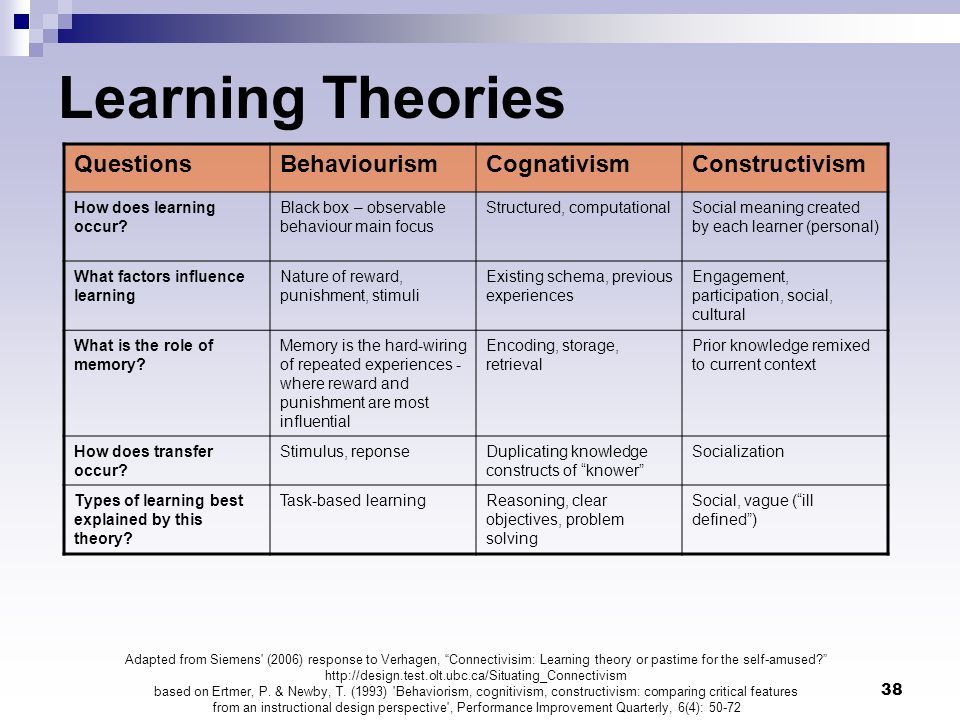 It is designed for use with middle school and high school students but can be adapted for use with younger students. http://www.researchpress.com/scripts/product.asp?item=5063
It is designed for use with middle school and high school students but can be adapted for use with younger students. http://www.researchpress.com/scripts/product.asp?item=5063 - The ACCEPTS Program (Walker et al) Offers a complete curriculum for teaching effective social skills to students at middle and high school levels. The program teaches peer-to-peer skills, skills for relating to adults, and self-management skills.http://www.proedinc.com/store/index.php?mode=product_detail&id=0365
For further resources go to www.nasponline.org.
© 2002, National Association of School Psychologists, 4340 East West Highway, Suite 402, Bethesda, MD, 20814, (301) 657-0270, fax (301) 657-0275, TTY (301) 657-4155.
Social Skills: A Learned Behavior
Guest Authored By Salena S, RBT, BS
Children watch everything we do. The way we treat others and how we interact with others in public and private spaces forms a mold for them to follow.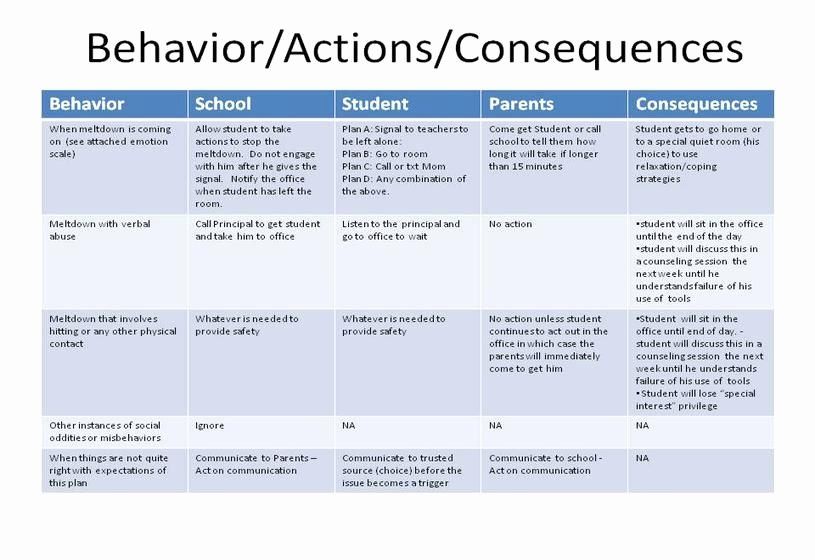 Social skills are learned skills and must be learned from others. Saying ‘please’ and ‘thank you’, treating each other with kindness and patience, sounds simple right? However, there is so much more to it than that. These skills may be very challenging to learn and there are many ways we equip children to be successful in social situations.
Social skills are learned skills and must be learned from others. Saying ‘please’ and ‘thank you’, treating each other with kindness and patience, sounds simple right? However, there is so much more to it than that. These skills may be very challenging to learn and there are many ways we equip children to be successful in social situations.
What exactly does the development of these skills do?
- Communication & Active Listening
- Problem-Solving (Conflict Resolution)
- Self-Management (taking responsibility for our own actions and behavior)
- Decision Making
- Building Peer Relationships
Teaching social skills is much like building a house; we first need to start with a foundation to build upon.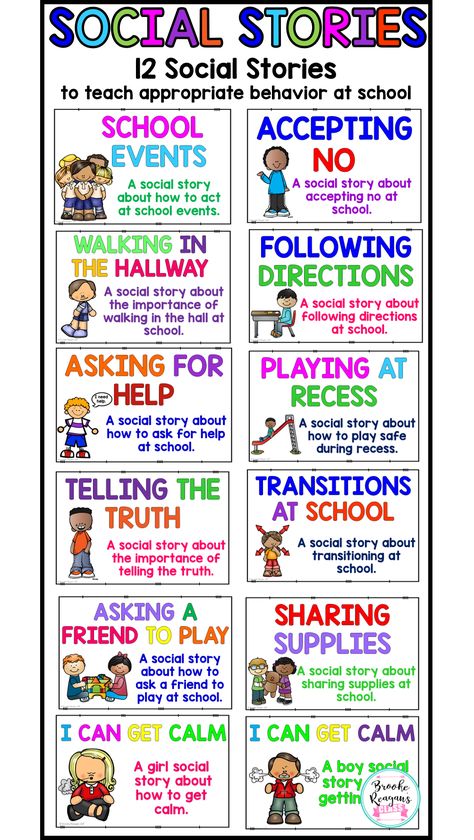 If we break social skills down to the foundation, we have three important skills:
If we break social skills down to the foundation, we have three important skills:
- Physical – ex: understanding of appropriate space from peers, eye contact, understanding of emotions through body language and facial expressions
- Verbal – ex: initiation of social situations, turn taking during play and conversation, staying on topic
- Thinking – interpreting and responding to emotions, behaviors, and thought of others
Each of these skills varies within every person we encounter. They are best learned through play and being exposed to many social situations.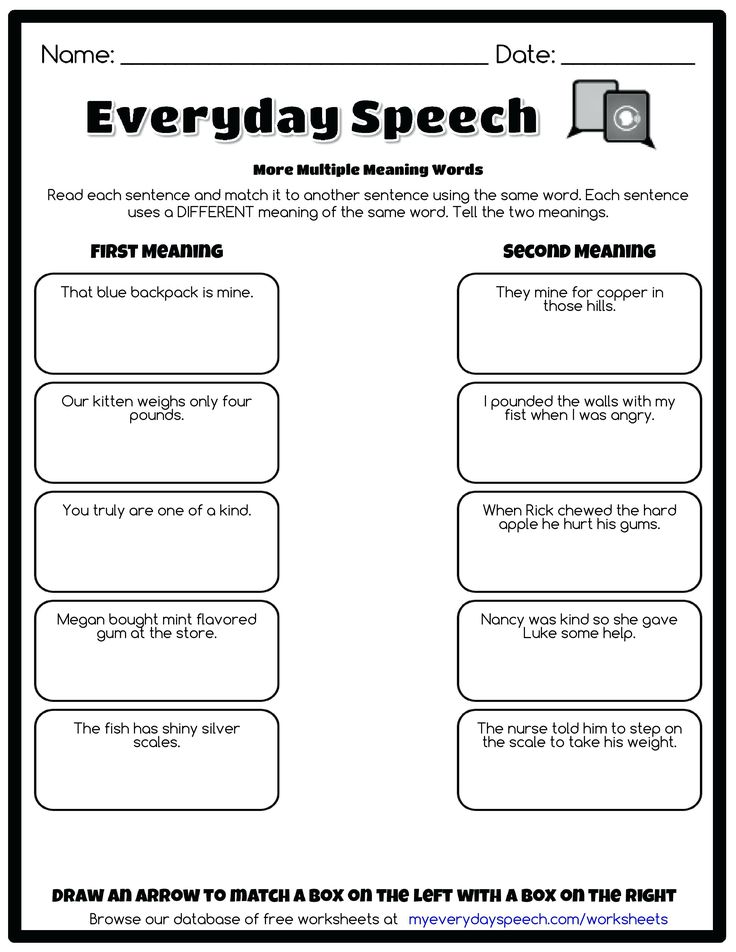 By playing games, children are taught how to gain attention of other in an appropriate way, initiation of play, rules, turn taking, along with being fair when winning or losing. Language skills, such as requesting for a turn all the way up to conversation during play, are learned during game play. Children learn how to encounter and navigate disputes with peers during play and to maintain appropriate physical behavior during these interactions.
By playing games, children are taught how to gain attention of other in an appropriate way, initiation of play, rules, turn taking, along with being fair when winning or losing. Language skills, such as requesting for a turn all the way up to conversation during play, are learned during game play. Children learn how to encounter and navigate disputes with peers during play and to maintain appropriate physical behavior during these interactions.
There are many benefits to game play besides learning social skills. Children will also be exposed to fine and gross motor skills that will allow them to further their options in future social skills engagements. During play we must model appropriate interactions, support them with any challenges of verbal communication, challenge them to respond on their own, provide feedback, and supply alternative responses to scenarios.
Teaching social skills to children cannot be done overnight. It will require exposure and practice, practice, practice.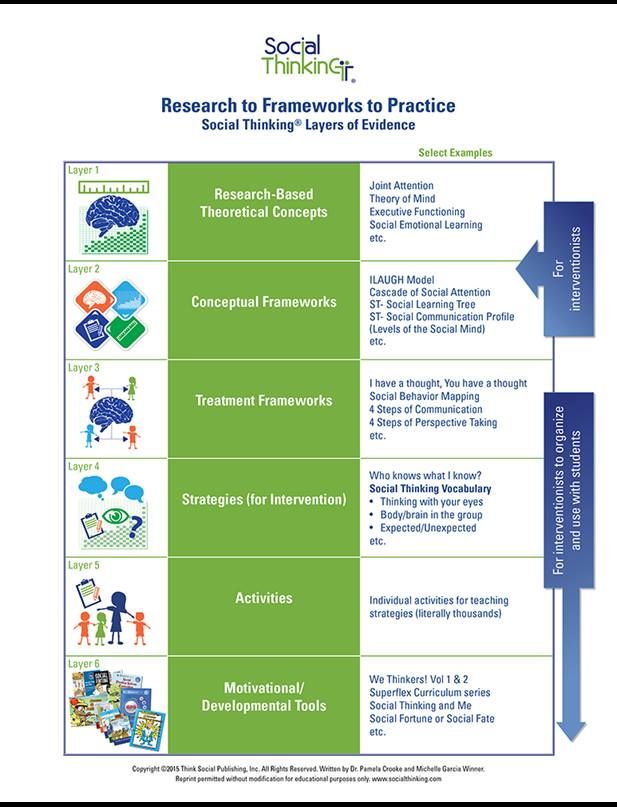 No matter your age, you are still learning social skills and practicing them daily. LeBron James did not acquire his basketball skills within a year, five years, or ten years. He had coaches who helped him break down his skills and to provide feedback on how to improve. He used drills and practices with others to grow his skills. He has worked on them tirelessly every day, and still does to this day to ensure he is the best he can be. This is how we must approach teaching social skills, because that is exactly what it is, a skill. Providing opportunities and support will help your child flourish in the many social situations they will encounter throughout life.
No matter your age, you are still learning social skills and practicing them daily. LeBron James did not acquire his basketball skills within a year, five years, or ten years. He had coaches who helped him break down his skills and to provide feedback on how to improve. He used drills and practices with others to grow his skills. He has worked on them tirelessly every day, and still does to this day to ensure he is the best he can be. This is how we must approach teaching social skills, because that is exactly what it is, a skill. Providing opportunities and support will help your child flourish in the many social situations they will encounter throughout life.
Learn more about Salena
WEST LOOP LOCATION
1233 W Adams St, Chicago, IL 60607
WHEATON LOCATION – Now Open!
140 E Loop Rd, Wheaton, IL 60189
NORTHCENTER LOCATION
1921 W Irving Park Rd, Chicago, IL 60613
CONTACT INFORMATION
(312) 243-8487
info@bbdprogram.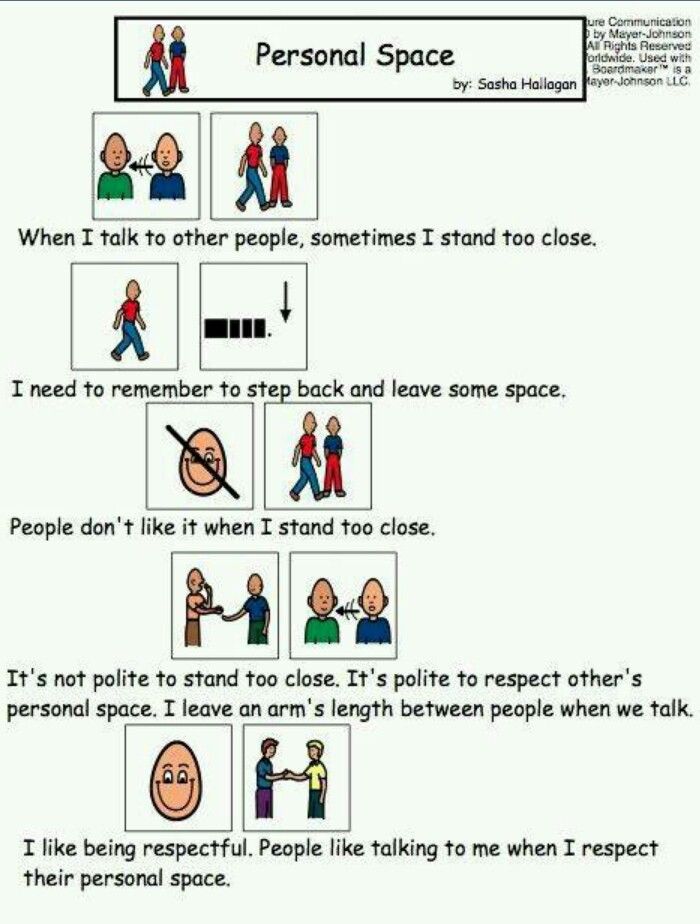 com
com
Social skills: what are they and how to develop them
May 22, 2020
Social skills are the skills a person has to successfully interact with others. They allow you to competently conduct a dialogue, improve the quality of communication, and also keep your emotions under control. Many people think that social skills are just about being able to communicate. But this is a misconception. In this article, you can learn in detail about the development, formation and features of social skills.
Types of social skills
Developed social skills allow a person to control his emotional state and express himself in various areas. A person who is able to develop social skills can successfully lead people, have good persuasive power. The formation of such skills allows you to correctly convey the position, using logic or eloquence at the right time.
Social and communication skills include:
- presenting oneself and greeting another person;
- control of voice, emotions, keeping calm, sincerity;
- conducting a conversation and presenting oneself in a team;
- the ability to accept compliments and respond to criticism.
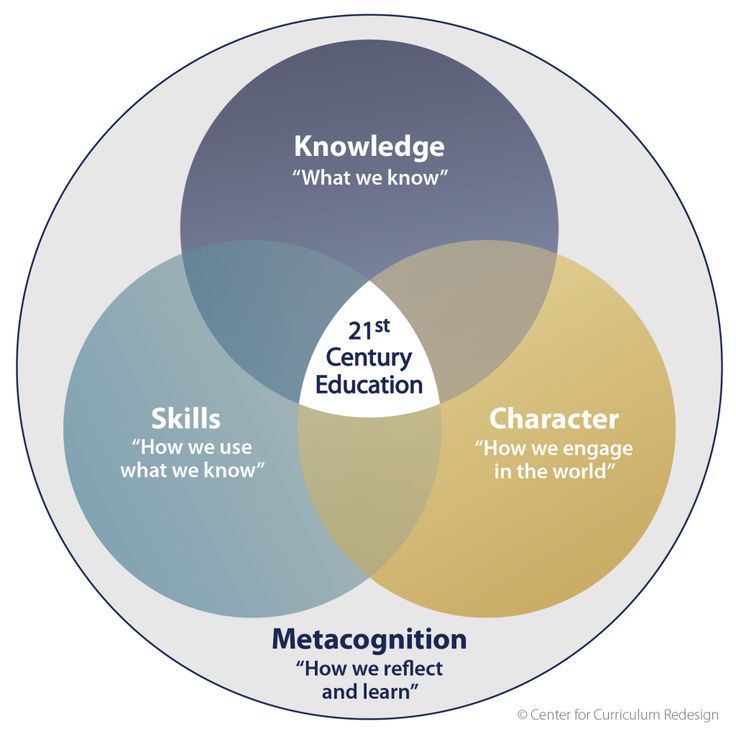
Methods for developing skills
By developing social skills, a person becomes more charismatic, self-confident and calm. He learns to achieve his goal in life, climbs the career ladder. The main methods of forming social skills are as follows:
- Getting someone else's opinion. It is impossible to see your behavior from the outside, so in this case it is worth asking for help from another person who will point out mistakes, advantages and disadvantages. It is desirable to take into account the opinion of several people.
- Gaining self-confidence. Having completely relaxed in communication, a person becomes more charming and able to maintain an interesting conversation. If you notice that insecurity prevents you from showing social skills, then you need to eradicate this problem.
- Communication with successful people. Social skills can be formed by communicating with people who have managed to achieve great heights in life. When communicating, try to pay attention to how successful people behave.
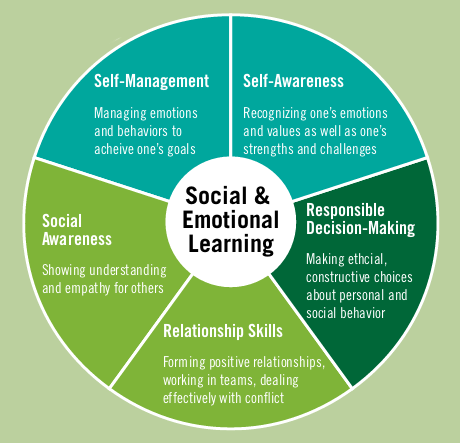 Draw some conclusions for yourself, but avoid imitation. Do not be afraid to make new acquaintances, surround yourself with strong people and, if necessary, ask them for advice.
Draw some conclusions for yourself, but avoid imitation. Do not be afraid to make new acquaintances, surround yourself with strong people and, if necessary, ask them for advice. - Practice regularly. Even if you read a lot of smart books and articles, but do not practice, all your skills will come to naught. Try to communicate regularly with people, improving social skills. And the online intensive Wikium "Effective Communication" will help you learn how to interact with people in any situation.
Additional recommendations
All suggested teaching methods are quite simple. You can supplement them with the following recommendations:
- develop a sense of empathy towards others;
- be interested in other people's problems and become an active listener;
- share your stories and learn to listen to others;
- travel, walk around the city a lot;
- develop acting talent;
- learn how to properly resolve conflict situations.
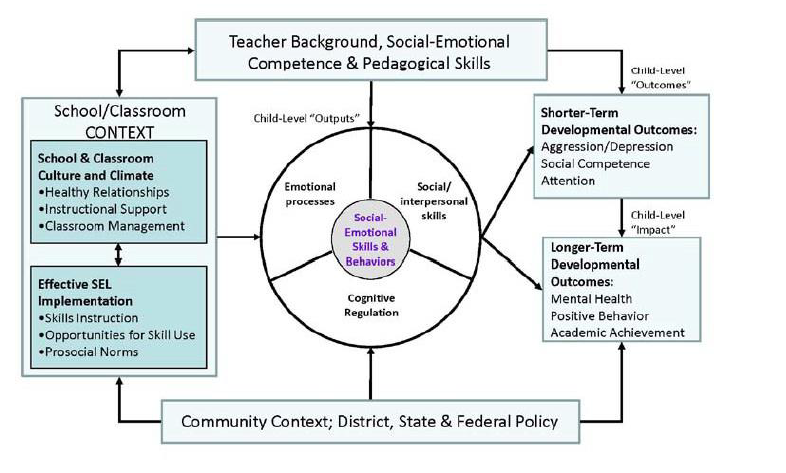
All these simple and uncomplicated rules are significant in the development of social skills. But often people are hindered by fear, insecurity, irascibility, arrogance, excessive gullibility. All these behavioral reactions prevent a person from interacting normally with society and building harmonious relationships. Try to look at life more simply, develop talents, and also work on your shortcomings. Then you will become an excellent interlocutor and will be able to prove yourself.
Social skills of preschoolers - the development of social skills in children
The development of social skills is a necessary point of education. A child with a high degree of socialization will quickly get used to kindergarten, school, any new team; in the future will easily find a job. Social skills have a positive effect on interpersonal relationships - friendship, the ability to cooperate.
Let's figure out what social skills are.
What are social skills and why develop them?
Social skills - a group of skills, abilities that are formed during the interaction of a person with society and affect the quality of communication with people.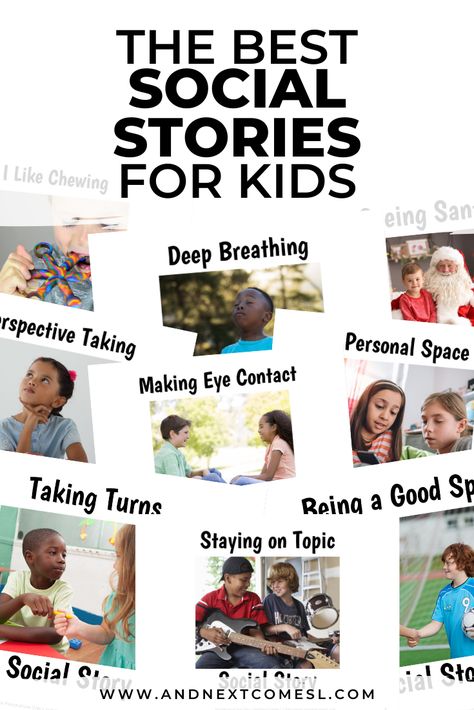
Man is a social being: all our talents and aspirations are realized thanks to other members of the group. Others evaluate our actions, approve or condemn our behavior. It is difficult to reach the pinnacle of self-actualization alone.
That is why social skills are important. They should be developed from early childhood and honed throughout life.
Social skills are a reflection of the child's emotional intelligence, to which educators and teachers assign an important role in the process of personality development. Without this group of skills, a smart child will not be able to apply the acquired knowledge in practice: it is not enough to create something outstanding, you need to be able to correctly convey thoughts to the public.
Sometimes people mistakenly believe that social skills relate exclusively to the topic of communication, communication. In fact, skills include many multidirectional aspects: an adequate perception of one's own individuality, the ability to empathize, work in a team, etc.
Why do we need social skills?
- Regulate the area of interpersonal relationships: the child easily makes new friends, finds like-minded people.
- Minimize psychological stress: children with developed social skills quickly adapt, do not feel sad due to changes in external circumstances.
- Form adequate self-esteem from childhood, which positively affects life achievements, development in adulthood.
- Social skills cannot be separated from building a successful career: the best specialists must not only understand the profession, but also have high emotional intelligence.
Development of social skills in a child
Social skills need to be developed from preschool age, but older children and even teenagers may well learn to interact with the world.
It is recommended to pay attention to areas of life that bring discomfort to the child, significantly complicate everyday life.
- Friends, interesting interlocutors: the kid does not know how to join the team, he prefers to sit in the corner while the others are playing.
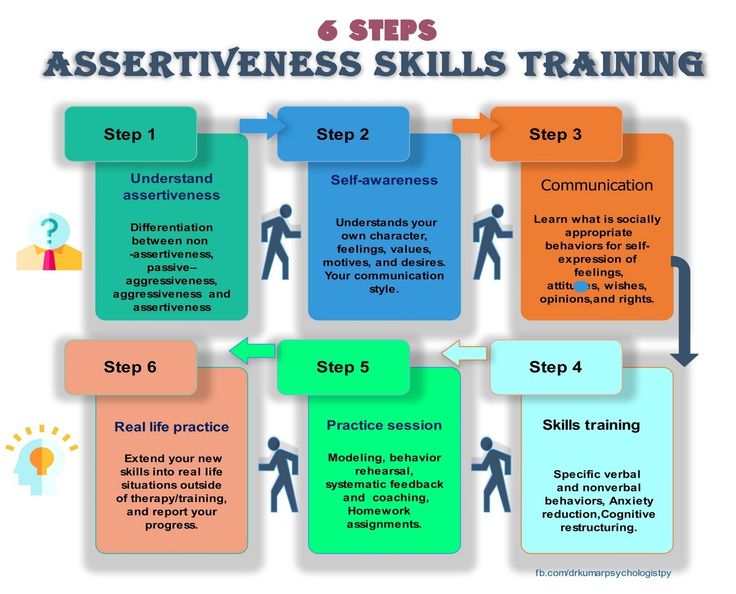
- Verbal difficulties. The child does not understand the rules of conversation, is poorly versed in the formulas of etiquette (when you need to say hello, say goodbye, offer help).
- Problems with the non-verbal side of communication. Such a baby does not recognize the shades of emotions, it is difficult to understand how others relate to him. Cannot "read" faces and gestures.
- Does not know the measure in expressing a point of view: too passive or, conversely, aggressive.
- The child bullies classmates (participates in bullying) or is a victim.
In case of severe moral trauma, one should consult a psychologist: for example, school bullying is a complex problem that children are not able to cope with on their own. The involvement of parents and teachers is required.
In other cases, family members may well be able to help the child develop social skills.
What are the general recommendations?
1.
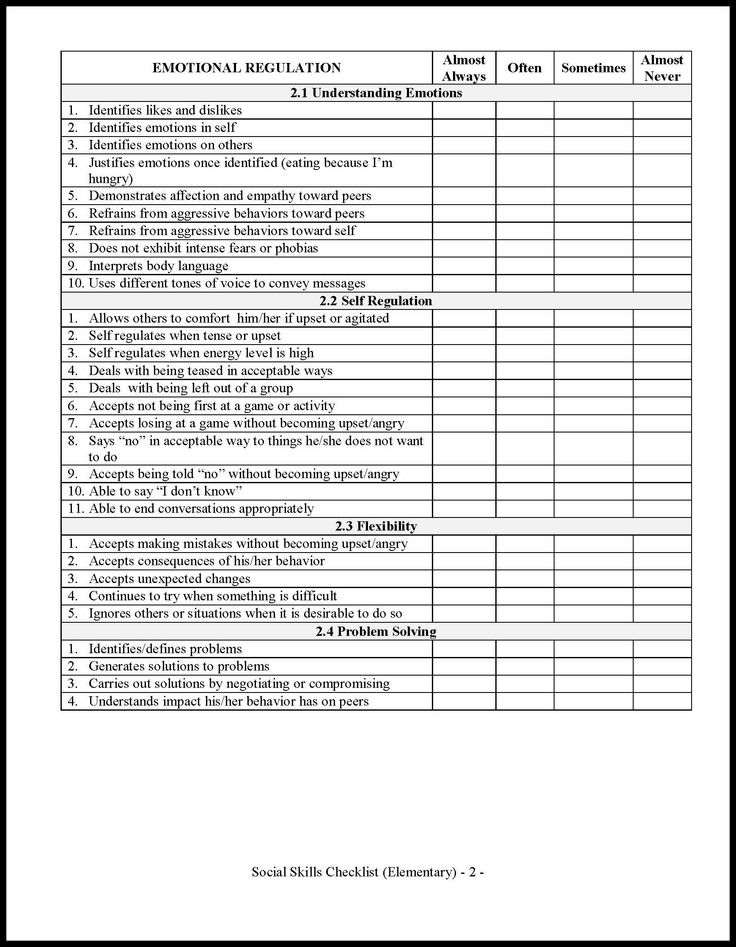 Be patient
Be patient Don't push your child to get things done. Let them take the initiative: for example, do not rush to help during school gatherings, let the baby work on the problem on his own. The same goes for lessons and other activities.
2. Support undertakings
Children's dreams seem trifling to adults, but the initiative turns into a habit over the years and helps to discover new projects, meet people, and experiment.
3. Criticize the right way
When making a negative comment, remember the golden rule of criticism: you need to analyze the work, highlighting both positive and negative aspects in a polite manner. Commenting on the specific actions of the child, and not his personality or appearance - this will lead to problems with self-esteem.
4. The right to choose
It is important for children to feel that their voice is taken into account and influences the course of events. Invite your child to personally choose clothes, books, cartoons.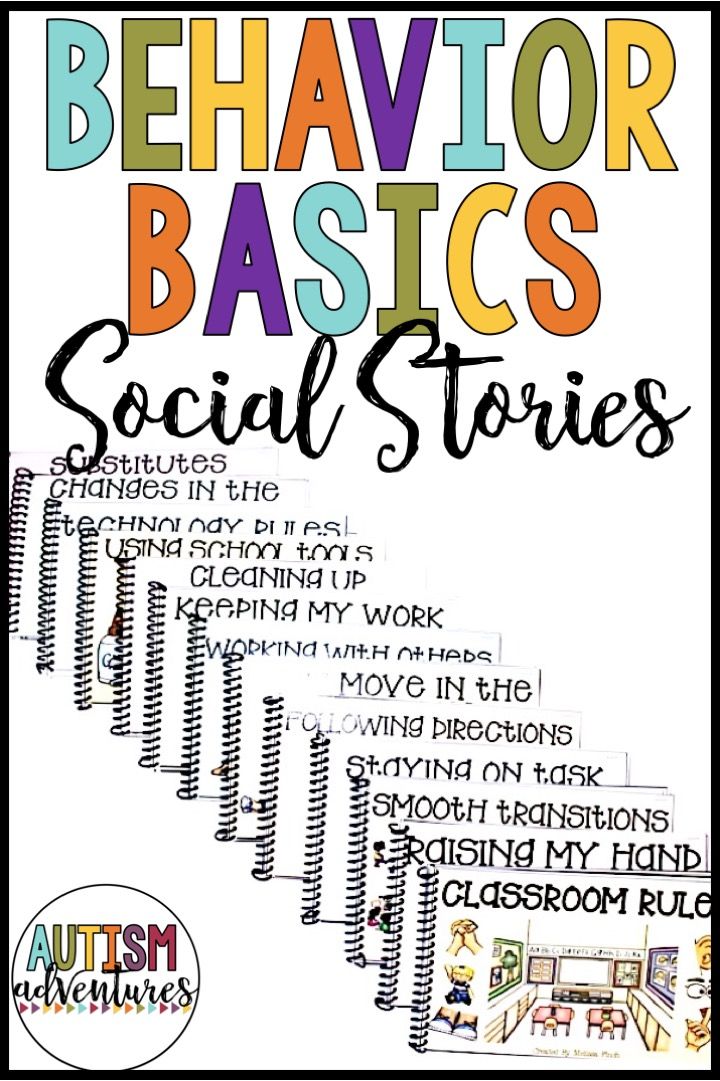 Ask about ideas, plans: “We are going to have a rest together at the weekend. What are your suggestions?
Ask about ideas, plans: “We are going to have a rest together at the weekend. What are your suggestions?
5. Personal space
Make sure that the baby has a place where he can be alone, take a break from talking. Personal things should not be touched: rearrange without prior discussion, read correspondence with friends, check pockets, etc.
Children, noticing the respectful attitude of adults, quickly begin to pay in the same coin; the atmosphere in the family becomes warm and trusting.
What social skills should be developed in a child?
Let's dwell on the main qualities and skills, the development of which is worth paying attention to.
1. The ability to ask, accept and give help
Without the ability to ask for help, the child will deprive himself of valuable advice; the lack of the ability to accept help will lead to losses, and the inability to provide help will make the baby self-centered.
- Let the child help those in need: for example, a lagging classmate.
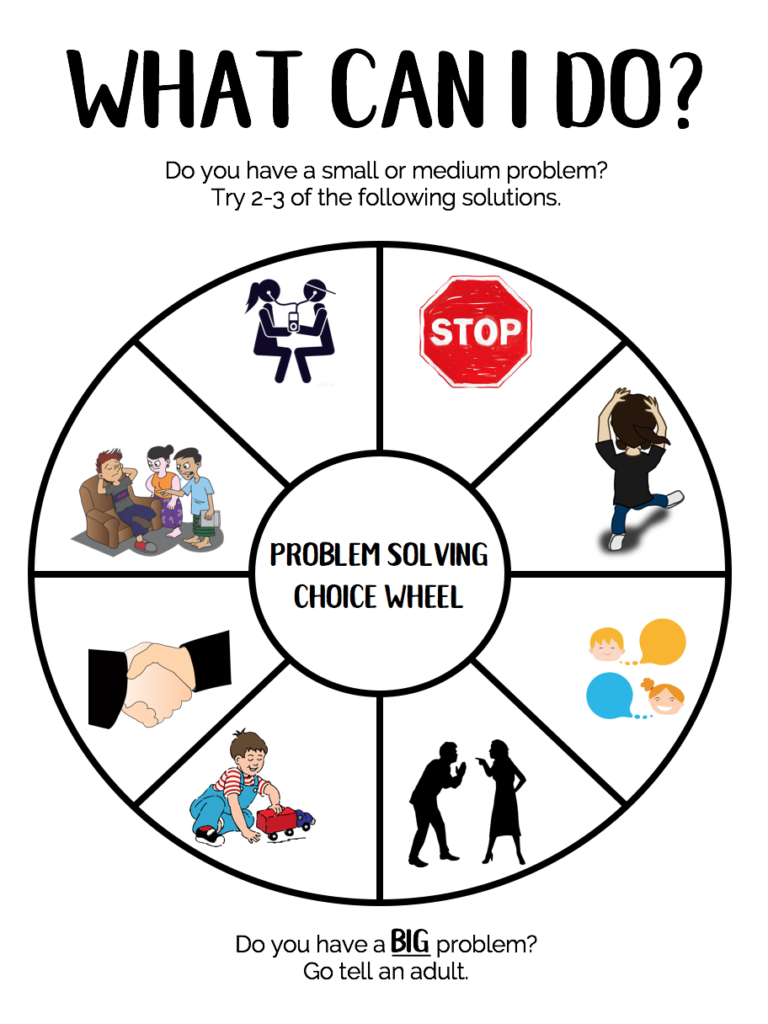
- Explain to your child that getting help from friends and teachers is not a shame.
- Show by personal example that mutual help enriches experience: tell how you exchange advice with colleagues, friends.
2. The ability to conduct a conversation and get the right information
Being a good conversationalist is difficult, but the skill is honed over time and brings a lot of benefits.
- Prompt your child for dialogue development options: for example, you can start a conversation with a relevant question, a request for help.
- Do not leave the child in the role of a silent listener: when discussing pressing issues at home, ask the opinion of the baby.
- Support children's public speaking: reports at school, performances, funny stories surrounded by loved ones will add confidence.
3. Empathy
Empathy is the ability to recognize the emotions of others, put yourself in the place of another person, empathize.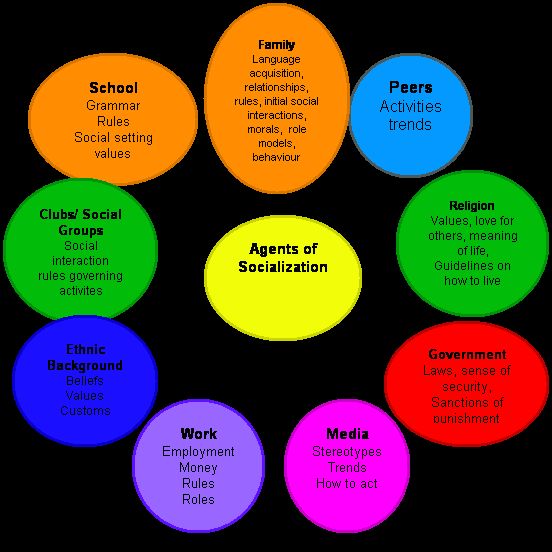
This ability will make the child humane, prudent. How can it be developed?
- Start by recognizing the child's feelings - it is useless to listen to people if the person does not feel personal experiences. Ask your baby: “How do you feel after a quarrel with friends?”, “Do you want to relax today?”
- After conflicts with classmates, ask your child how the children with whom the quarrel may feel now.
- While watching cartoons, reading books, pay your child's attention to the emotional state of the characters.
4. Ability to work in a team
Many children can easily cope with tasks alone, but this is not a reason to refuse to work in a team. It gives the opportunity to exchange ideas and experience, delegate tasks, achieve goals faster and more efficiently.
- If the child does not communicate with members of the team, try to introduce him to another social group: for example, the lack of communication with classmates can be compensated by a circle of interests, where the child will feel calmer.
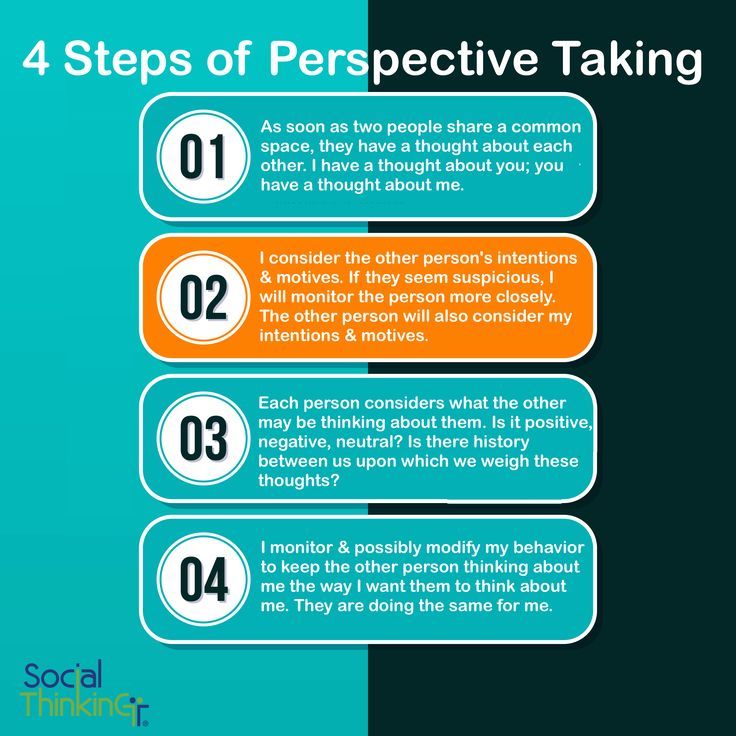
- Make the family a friendly team in which the child has his own "duties": for example, do housework, remind parents of upcoming events. Any activity related to the well-being of other family members will do.
5. Respect for personal boundaries
The absence of an obsessive desire to interfere in other people's lives is a valuable skill that helps to win people's sympathy.
- Respect the child's personal boundaries: do not enter the nursery unannounced, do not rummage through personal belongings and correspondence, if the matter does not concern the life and safety of the baby.
- If the child violates other people's boundaries (takes toys without permission, asks uncomfortable questions), talk about it in private.
6. Ability to overcome conflict situations
It is difficult to imagine our life without conflicts. The task of the child is to learn how to culturally enter into a discussion, defend his point of view, and not be led by the provocations of his interlocutors.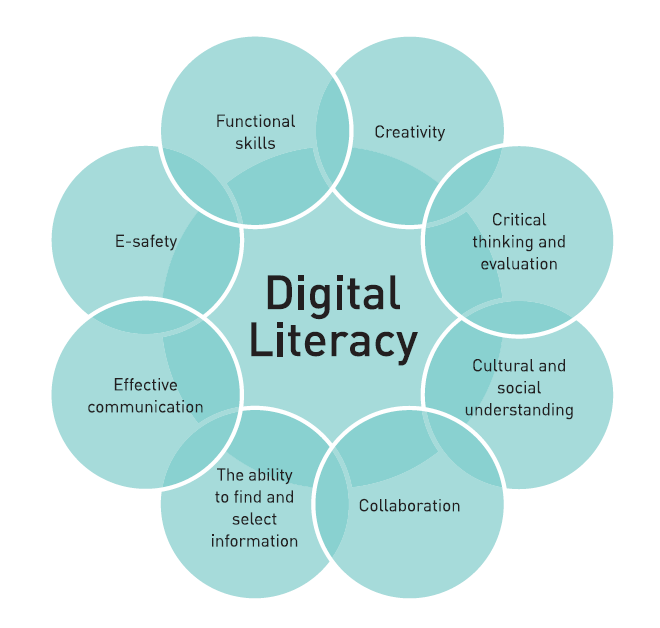
- Talk about problems calmly, without raising your voice. Do not put pressure on the child with parental authority unnecessarily: the child is a separate person who has the right to an opinion.
- Do not judge people for views that differ from those of your family but do not affect your well-being. Show your child that the world is very different.
- You can demonstrate to children the basics of a civilized dispute, explain what arguments are, etc. It is advisable to teach this child in kindergarten.
7. Self-confidence
Stable and adequate self-esteem is a quality that not all adults possess.
It is formed under the influence of many factors: relationships between parents, the role of the child in the family circle, the characteristics of the environment that surrounded the child in early childhood.
It is important that the child does not grow up to be either a narcissistic narcissist with fragile self-esteem, or an overly shy person.